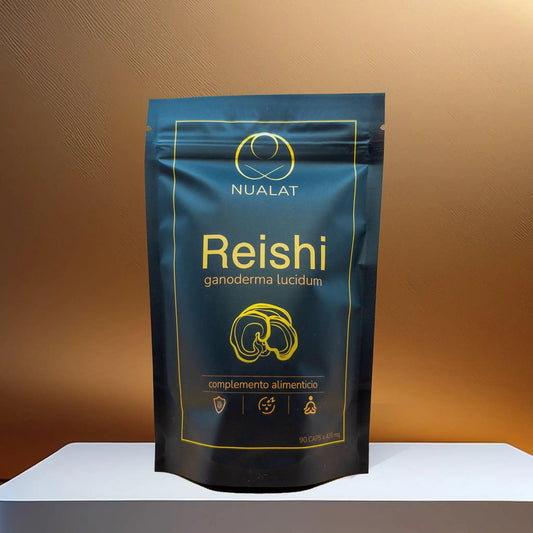
Adaptogenic Mushrooms and Their Health Benefits
Share
In recent years, adaptogenic mushrooms have gained popularity as natural allies to promote health and well-being. Mushrooms have been used for centuries in traditional medicine, especially in Asia, and are now backed by scientific research highlighting their therapeutic potential. But what does it mean for a mushroom to be “adaptogenic”? What specific benefits can they offer? Here we explain in detail, with a special focus on Reishi and Lion’s Mane.
What are adaptogens?
The term "adaptogen" refers to natural substances that help the body adapt to physical, emotional and environmental stress. Adaptogens do not act specifically on a disease, but rather promote homeostasis, i.e. the internal balance of the organism. This concept, introduced by Russian scientists in the 1950s, applies to adaptogenic mushrooms because they contain bioactive compounds that improve the body's resistance to adverse situations.
Adaptogenic mushrooms, such as Reishi (Ganoderma lucidum) and Lion's Mane (Hericium erinaceus), are packed with polysaccharides, triterpenes and antioxidants, which play a crucial role in strengthening the immune system, regulating stress and protecting against disease.
Reishi is one of the most studied and valued mushrooms in traditional Chinese medicine. Known as the "mushroom of immortality," its name is no coincidence: for centuries, it has been credited with the ability to promote longevity and vitality. Reishi's active compounds, such as triterpenoids and β-glucans, have demonstrated a remarkable ability to strengthen the immune system. According to the study Fungal Mushrooms: A Natural Compound With Therapeutic Applications Chugh et al. (2022) , these compounds stimulate the activity of NT cells and macrophages, key to fighting infections and toxins.
In addition, Reishi stands out for its calming effect. By regulating cortisol levels, the stress hormone, it can help improve sleep quality and reduce anxiety symptoms. As if that were not enough, it has antioxidant and anti-inflammatory properties that contribute to cardiovascular health and the prevention of diseases related to aging, such as hypertension.
Lion's Mane: Cognitive and Nervous Health
On the other hand, Lion's Mane, scientifically known as Hericium erinaceus , is recognized for its effects on cognitive function and the nervous system. This mushroom is particularly rich in hericenones and erinacines, compounds that have been shown to stimulate the production of nerve growth factor (NGF). This factor is essential for the regeneration and maintenance of neurons, making Lion's Mane a promising candidate for supporting memory, concentration, and brain health.
Recent research suggests that Lion's Mane may also be useful in managing neurodegenerative diseases. Although larger clinical studies are still needed, initial results indicate that it may have a positive impact on conditions such as mild cognitive impairment and depression.
General Benefits of Adaptogenic Mushrooms
In addition to the specific benefits of Reishi and Lion's Mane, adaptogenic mushrooms in general offer a number of therapeutic properties:
 Incorporation into the diet
Incorporation into the diet
Adaptogenic mushrooms are available in various forms, such as extracts, capsules, powders, and tea, making them easy to include in your daily routine. However, it is essential to choose quality products, preferably from organic sources and subjected to laboratory testing, to ensure their safety and efficacy.
Although adaptogenic mushrooms are not a substitute for medical treatments, they can be a valuable complementary tool. It is advisable to consult with a health professional before starting any supplementation, especially if you suffer from chronic diseases or are taking medications.
What are adaptogens?
The term "adaptogen" refers to natural substances that help the body adapt to physical, emotional and environmental stress. Adaptogens do not act specifically on a disease, but rather promote homeostasis, i.e. the internal balance of the organism. This concept, introduced by Russian scientists in the 1950s, applies to adaptogenic mushrooms because they contain bioactive compounds that improve the body's resistance to adverse situations.
Adaptogenic mushrooms, such as Reishi (Ganoderma lucidum) and Lion's Mane (Hericium erinaceus), are packed with polysaccharides, triterpenes and antioxidants, which play a crucial role in strengthening the immune system, regulating stress and protecting against disease.
Reishi is one of the most studied and valued mushrooms in traditional Chinese medicine. Known as the "mushroom of immortality," its name is no coincidence: for centuries, it has been credited with the ability to promote longevity and vitality. Reishi's active compounds, such as triterpenoids and β-glucans, have demonstrated a remarkable ability to strengthen the immune system. According to the study Fungal Mushrooms: A Natural Compound With Therapeutic Applications Chugh et al. (2022) , these compounds stimulate the activity of NT cells and macrophages, key to fighting infections and toxins.
In addition, Reishi stands out for its calming effect. By regulating cortisol levels, the stress hormone, it can help improve sleep quality and reduce anxiety symptoms. As if that were not enough, it has antioxidant and anti-inflammatory properties that contribute to cardiovascular health and the prevention of diseases related to aging, such as hypertension.
Lion's Mane: Cognitive and Nervous Health
On the other hand, Lion's Mane, scientifically known as Hericium erinaceus , is recognized for its effects on cognitive function and the nervous system. This mushroom is particularly rich in hericenones and erinacines, compounds that have been shown to stimulate the production of nerve growth factor (NGF). This factor is essential for the regeneration and maintenance of neurons, making Lion's Mane a promising candidate for supporting memory, concentration, and brain health.
Recent research suggests that Lion's Mane may also be useful in managing neurodegenerative diseases. Although larger clinical studies are still needed, initial results indicate that it may have a positive impact on conditions such as mild cognitive impairment and depression.
General Benefits of Adaptogenic Mushrooms
In addition to the specific benefits of Reishi and Lion's Mane, adaptogenic mushrooms in general offer a number of therapeutic properties:
- Immune strengthening: The β-glucans present in these mushrooms stimulate the immune response, making the body more resistant to infections.
- Antioxidant properties: Antioxidants neutralize free radicals, reducing cell damage and slowing down the aging process.
- Mood enhancement: By regulating the hypothalamic-pituitary-adrenal (HPA) axis, adaptogens contribute to emotional stability.
- Metabolic support: Some compounds help regulate blood sugar levels and improve insulin sensitivity.

Adaptogenic mushrooms are available in various forms, such as extracts, capsules, powders, and tea, making them easy to include in your daily routine. However, it is essential to choose quality products, preferably from organic sources and subjected to laboratory testing, to ensure their safety and efficacy.
Although adaptogenic mushrooms are not a substitute for medical treatments, they can be a valuable complementary tool. It is advisable to consult with a health professional before starting any supplementation, especially if you suffer from chronic diseases or are taking medications.






